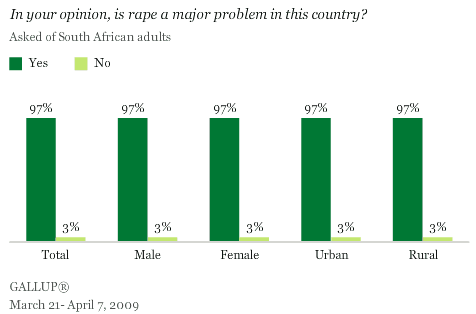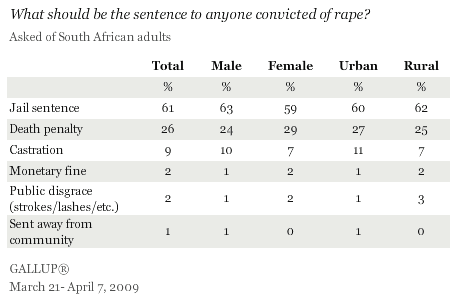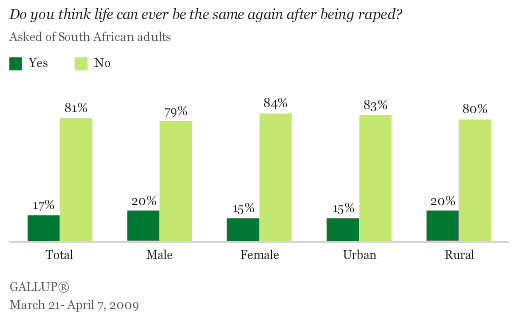WASHINGTON, D.C. -- A Gallup survey of South Africans conducted March 21-April 7, 2009, reaffirms the extent to which the issue of rape plagues the country -- with 97% of residents calling it a major problem.

The Gallup survey results add to statistics from Interpol estimating that a woman is raped every 17 seconds in South Africa, and that one in every two women will be raped in their lives in the country. According to Interpol, South Africa has the highest number of declared rapes in the world, with nearly half of the victims younger than 18.
In a recent survey conducted by South Africa's Medical Research Council in KwaZulu-Natal and Eastern Cape provinces, one in four men admitted to having raped someone, and nearly half said they had attacked more than one victim. The report also found acts such as gang rape to be common because they are considered a form of male bonding, or a way to prove one's manhood or power.
There's a general belief within the country that most rapes cases go unreported because of the stigma and shame attached to it. Nearly all respondents (97%) that Gallup surveyed say they think rape should be reported to the police. When asked in an open-ended question what they believe the sentence should be for anyone convicted of rape, 61% say a jail sentence and 26% say a rape conviction merits the death penalty. Overall, the views are fairly consistent across subgroups, including between men and women.

Why Is Rape Prevalent in South Africa?
Researchers suggest South Africa's history may shed light on the factors behind the high incidence of rape in the country. "Apartheid made violence an instrument of control and violence became the norm," rights activist Mbuyiselo Botha told the Associated Press. "Angry and humiliated, they [men] took out their frustrations then -- and still today -- on the weakest victims, women and children," activists say. Men's attitude toward women is at the root of the problem, which reveals a deeply rooted culture of violence against women, and of gender inequality. More recently, the country's current President Jacob Zuma was tried in 2006 for raping a family friend, although he was later acquitted. Botha said the trial did "tremendous damage" to efforts to change attitudes of violence toward women.
Interestingly, the Gallup data do not show significant differences across genders, with both genders realizing the seriousness of the problem of rape in South Africa.
The Way Forward?
Despite South Africans' clear desire for sanctions against those convicted of rape, the reality is very few of reported rapes are estimated to lead to a conviction.
Further, the superstitions about HIV/AIDS in South Africa reinforce the incidence of rapes. For instance, some men in the country believe that if they rape a virgin, in some cases young children and babies, they will no longer have HIV/AIDS. This belief is unfortunately not exclusive to South Africa.
The Gallup survey also asked about life after rape. Eighty-one percent of South Africans, including 84% women and 79% of men, say they think life cannot be the same after being raped.

The Gallup data reveal a clear desire among South Africans that rape offenders in their country be prosecuted and penalized. Without such, women and children in that country will be likely victims of further crime. The need to bring about stricter regulations for rape becomes even more urgent with next year's World Cup in South Africa bringing an influx of tourists to the country and putting the country on an international stage.
For complete data sets or custom research from the more than 150 countries Gallup continually surveys, please contact worldpollpartners@gallup.com or call 202.715.3030.
Survey Methods
Results are based on face-to-face interviews with 1,000 adults in South Africa, aged 15 and older, conducted March 21-April 7, 2009. For results based on the total sample of national adults, one can say with 95% confidence that the maximum margin of sampling error is ±4 percentage points. In addition to sampling error, question wording and practical difficulties in conducting surveys can introduce error or bias into the findings of public opinion polls.
